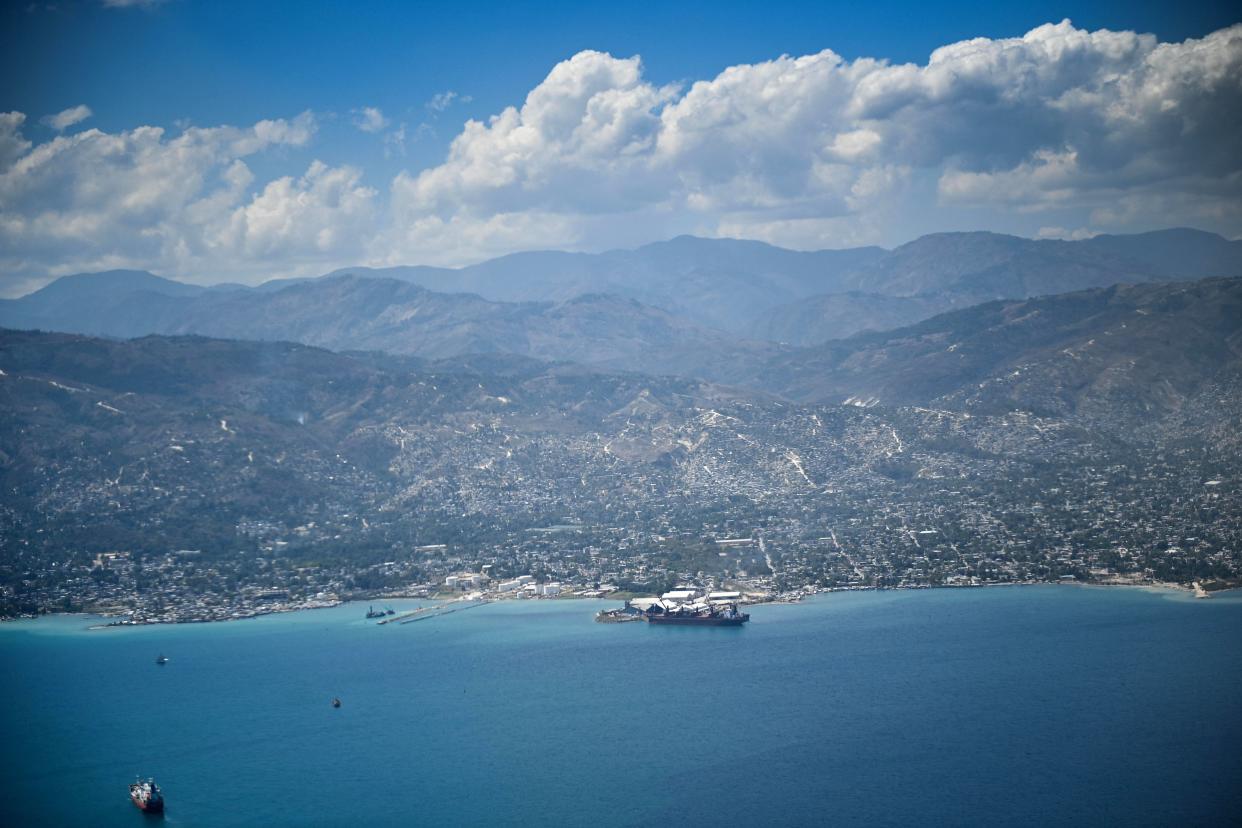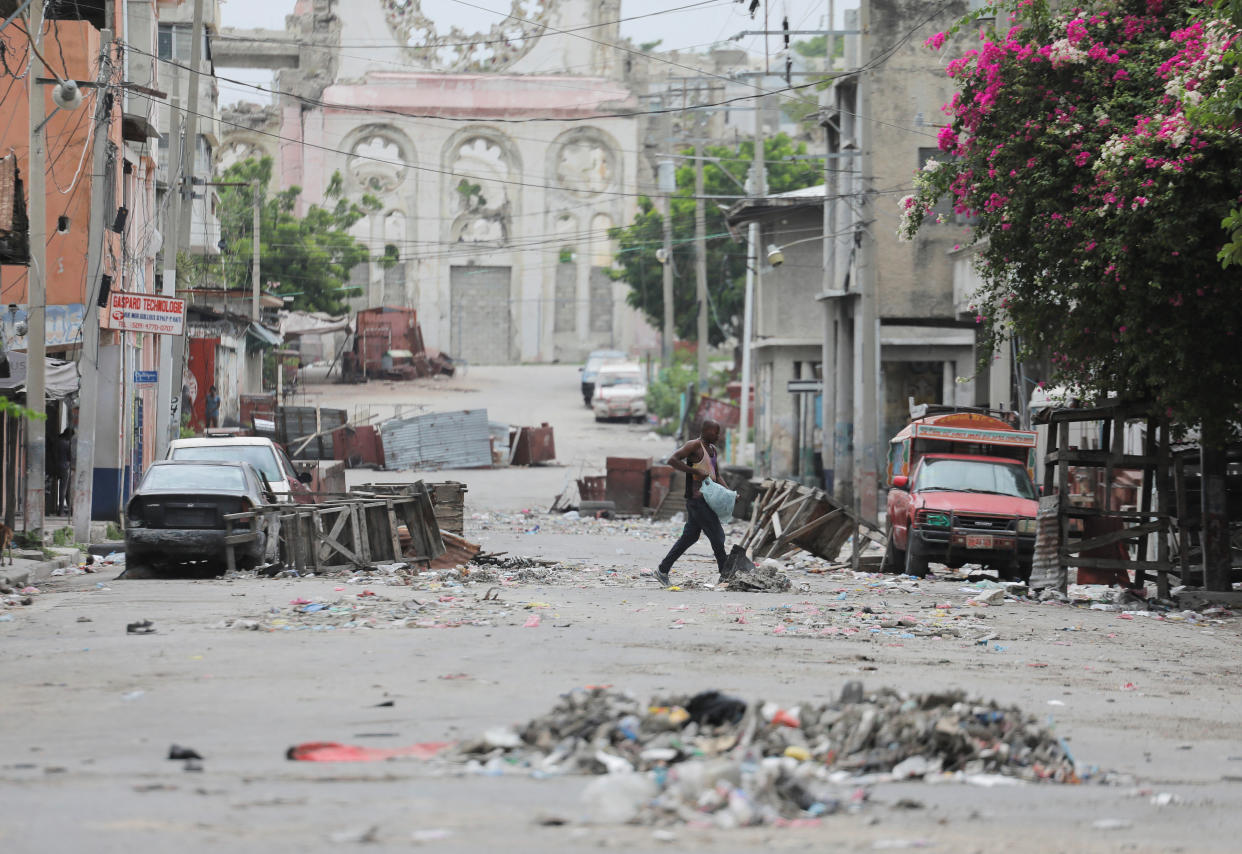U.S. couple held for ransom in Haiti as violence, kidnappings surge in the Caribbean nation

An American couple who visited Haiti earlier this month was kidnapped and is being held for ransom, a common occurrence in the country, where more than 100 kidnappings and 530 killings were reported in the first two weeks of March.
Abigail and Jean-Dickens Toussaint, both 33, live in Florida with their son who just turned 2 on Tuesday. According to their family, the couple had plans to visit sick relatives and attend a festival in their hometown of Leogane, Haiti, but they never made it to their destination.
“We didn't really want them to go,” Christie Desormes, Jean-Dickens Toussaint's niece, told Yahoo News. “I don't even know if they’re getting clean water, or actually being fed, or if they have been hurt," she added. "We were upset to find out that this even happened. We're trying to put on a brave face for each other and for their kid.”
After arriving at the airport, the Toussaints were met by a family friend to escort them, and while they were traveling by bus from the capital city of Port-au-Prince, they were confronted by a gang, the family said.

“There's supposed to be this agreement between the buses and the gang, to pay a fee every time they drive from the airport to our town of Leogane uninterrupted, but that bus driver apparently did not pay that fee, so they pulled them over,” Desormes said.
Desormes said her aunt, uncle and family escort were taken as collateral damage. Originally the ransom was set at $6,000 to get them back.
“They gave us names and where to transfer the money via Western Union, and [we] had to pay $2400 in advance, and then they would release our family, and then they would get the rest,” Desormes said. “After we sent the advancement, they didn't release them.”
Eleven days later, the Toussaints are still being held hostage. The U.S. State Department says it is aware of the situation.
“The Department of State and our embassies and consulates abroad have no greater priority than the safety and security of U.S. citizens overseas. We are in regular contact with Haitian authorities and will continue to work with them and our U.S. Government interagency partners,” a state department spokesperson told Yahoo News in a statement.
Currently Haiti has a level 4 out of 5 travel advisory that warns American citizens against traveling to the country due to the rise of kidnapping, civil unrest and crime.

The State Department website warns that “U.S. citizens should depart Haiti now in light of the current security and health situation and infrastructure challenges. Kidnapping is widespread and victims regularly include U.S. citizens.”
The violence in Haiti hit record levels following the assassination of Haitian President Jovenel Moise, and the country is now overcome with gang violence and is one of the poorest nations in the Western Hemisphere.
According to the U.N., as of this year, over 70% of the capital city of Port-au-Prince is controlled by Haitian gangs. “There's a lot of tension. There's a lot of gangs roaming the streets, taking parts of the territory,” Desmores said.
According to the U.N. Secretary-General’s January report to the security council, gang-related violence in Haiti has reached unprecedented levels. In 2022, authorities reported 2,183 homicides and 1,359 kidnappings, which is double the amount of the reported cases in 2021.
“The kidnappings that are happening in Haiti are directly tied to weak U.S policy to regulate guns that are coming from the U.S and going into the Caribbean, and more specifically to Haiti,”Jean Eddy Saint Paul, a native of Haiti and director of the CUNY Haitian Studies Institute, told Yahoo News. “Most of the guns that are killing people in Haiti came directly from the United States of America.”

Saint Paul says he hasn’t been back to his home country in years because it is too dangerous. “My soul, my umbilical cord is connected to Haiti. This is where I was born, this is where my family were born,” he said. According to him, kidnapping is not a part of the political history of Haiti. “Kidnapping has a history and a direct connection to U.S. imperialism, and in the broader scope, Western imperialism,” he said. The violence in Haiti has displaced over 160,000 people, the U.N. reported this month, and Saint Paul said the number will continue to surge if things don’t change.
The Toussaints were supposed to return home to their child and family on March 21, but now relatives say they are working with the FBI and pleading for the couple's safe return.
“The FBI is investigating, and they're also helping us get in contact with the gang again, so that we can begin negotiations with their help,” Desmores said.
Earlier this week, the First Haitian Baptist Church of Pompano Beach, Fla., posted on its Facebook page, asking that the congregation to pray for the Toussaints.“Along with our prayers, we are also challenging our government officials to use their resources in bringing these two back to us where they belong,” the post said.
The couple are constituents of Rep. Sheila Cherfilus-McCormick’s district. The Florida Democrat was unavailable for an interview, but her office told Yahoo News that she had plans to meet with the State Department on Tuesday about the ongoing investigation.
